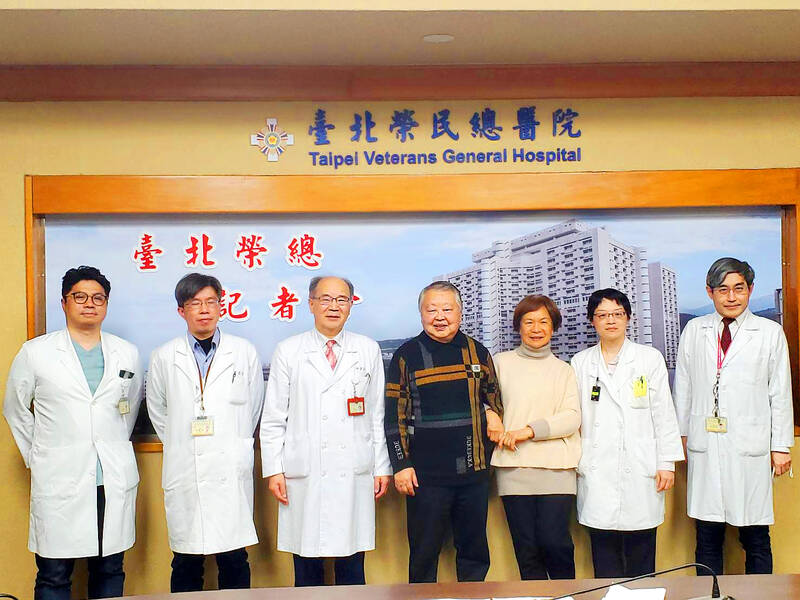Taipei Veterans General Hospital on Wednesday touted the successes of its Center of Advanced Image-Guided Intervention, which was established last year under the Radiology Department.
The center integrates medical imaging and minimally invasive medical treatments to provide patients with customized treatments.
A minimally invasive intervention for cancer treatment eliminates local tumor tissue and is guided by imaging tools, said Shen Shu-huei (沈書慧), director of the interventional radiology group under the Radiology Department, at a news conference.

Photo: Lin Hui-chin, Taipei Times
Compared with traditional open surgery, these treatments are less invasive, leave minimal incisions, take less time to recover and are less painful, Shen said.
One such treatment method included at the news event was cryoablation, which has been used in more than 600 cases since the hospital first introduced it in 2010.
A 73-year-old man, surnamed Kuo (郭), shared his experience of the treatment.
A 3cm tumor was discovered on Kuo’s right kidney when he was 61 years old and a doctor initially told him that it would be necessary to remove the fully-functional kidney because of the tumor’s location.
Instead, the hospital’s medical team used cryoablation to cure the tumor. Kuo was able to leave the hospital the day after the treatment, with his kidney intact and functioning, and there has been no sign of relapse over the past decade, Shen said.
Of about 300 cases diagnosed as kidney cancer, about 95 percent were under control following the first intervention and up to 99 percent were brought under control after repeated treatment, Shen said.
Sudies show that the new treatment’s medical effect is equivalent to surgery when treating tumors smaller than 4cm in length, Shen said, adding that unlike radioactive treatment, it has no dosage limits, so the process can be repeated in the event of a relapse.
The treatment is mainly used for kidney tumors, as well as tumors in the liver, lungs, musculoskeletal system and lymph node metastasis, Shen said.
However, cryoablation cannot be used for patients with coagulopathy (a bleeding disorder), when the cancer has invaded the intestines or in endovascular cancer cases, Shen said.
During the cryoablation procedure, a probe is guided to the tumor tissue using imaging, after which the argon/helium at the tip of the probe is rapidly compressed, which reduces the temperature to minus-160°C, forming ice crystals on the tumor and disrupting it, Shen said.
Taipei Veterans General Hospital’s Radiology Department chief Chiou Hong-jen (邱宏仁) said image guidance is essential for minimally invasive treatments and is not limited to X-rays.
The unit is to be renamed the Medical Imaging Department after official approval from the Veterans Affairs Council. Chiou said.

An apartment building in New Taipei City’s Sanchong District (三重) collapsed last night after a nearby construction project earlier in the day allegedly caused it to tilt. Shortly after work began at 9am on an ongoing excavation of a construction site on Liuzhang Street (六張街), two neighboring apartment buildings tilted and cracked, leading to exterior tiles peeling off, city officials said. The fire department then dispatched personnel to help evacuate 22 residents from nine households. After the incident, the city government first filled the building at No. 190, which appeared to be more badly affected, with water to stabilize the

Taiwan plans to cull as many as 120,000 invasive green iguanas this year to curb the species’ impact on local farmers, the Ministry of Agriculture said. Chiu Kuo-hao (邱國皓), a section chief in the ministry’s Forestry and Nature Conservation Agency, on Sunday said that green iguanas have been recorded across southern Taiwan and as far north as Taichung. Although there is no reliable data on the species’ total population in the country, it has been estimated to be about 200,000, he said. Chiu said about 70,000 iguanas were culled last year, including about 45,000 in Pingtung County, 12,000 in Tainan, 9,900 in

DEEPER REVIEW: After receiving 19 hospital reports of suspected food poisoning, the Taipei Department of Health applied for an epidemiological investigation A buffet restaurant in Taipei’s Xinyi District (信義) is to be fined NT$3 million (US$91,233) after it remained opened despite an order to suspend operations following reports that 32 people had been treated for suspected food poisoning, the Taipei Department of Health said yesterday. The health department said it on Tuesday received reports from hospitals of people who had suspected food poisoning symptoms, including nausea, vomiting, stomach pain and diarrhea, after they ate at an INPARADISE (饗饗) branch in Breeze Xinyi on Sunday and Monday. As more than six people who ate at the restaurant sought medical treatment, the department ordered the

ALLEGED SABOTAGE: The damage inflicted by the vessel did not affect connection, as data were immediately rerouted to other cables, Chunghwa Telecom said Taiwan suspects that a Chinese-owned cargo vessel damaged an undersea cable near its northeastern coast on Friday, in an alleged act of sabotage that highlights the vulnerabilities of Taipei’s offshore communications infrastructure. The ship is owned by a Hong Kong-registered company whose director is Chinese, the Financial Times reported on Sunday. An unidentified Taiwanese official cited in the report described the case as sabotage. The incident followed another Chinese vessel’s suspected involvement in the breakages of data cables in the Baltic Sea in November last year. While fishing trawlers are known to sometimes damage such equipment, nation states have also